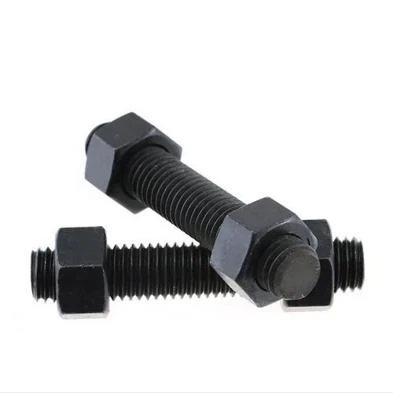Exporters of A193 B7M Stud Bolts for Industrial Applications
Nov . 09, 2024 07:06 Back to list
Exporters of A193 B7M Stud Bolts for Industrial Applications
Understanding Stud Bolt A193 B7M and Its Global Export Market
In various industrial applications, the need for reliable fastening solutions is paramount. One such solution is the stud bolt, particularly those conforming to the ASTM A193 B7M standard. This article aims to delve into the nuances of stud bolts, their specifications, and the landscape of their exporters globally.
What is a Stud Bolt?
A stud bolt is a long rod with threads on both ends, designed to be used with nuts to assemble flanged pipes. Unlike standard bolts, which have heads, stud bolts offer several advantages including ease of installation and greater flexibility in terms of length since they can be cut to meet specific application requirements. The dual-threaded design allows for a more secure fastening, which is crucial in high-pressure and high-temperature environments commonly encountered in the oil, gas, and chemical industries.
ASTM A193 B7M Specification
The ASTM A193 B7M specification is a standard associated with high-strength stud bolts, particularly made from an alloy steel material known for its excellent mechanical properties. These bolts are often used in high-temperature applications and environments where the temperature can fluctuate drastically.
1. Material Composition ASTM A193 B7M stud bolts are made from chromium-molybdenum steel (about 1% chromium and 0.5% molybdenum), which enhances their strength and corrosion resistance, making them suitable for various critical applications. 2. Mechanical Properties The tensile strength of these bolts is significantly high, typically around 125,000 psi (862 MPa) at room temperature. This makes them a preferred choice for critical applications in petrochemical and power generation sectors.
3. Temperature Capabilities The B7M specification allows for usage in elevated temperature conditions, generally up to 300°F (149°C). This capacity makes B7M stud bolts especially crucial in settings where thermal expansion and contraction are factors.
stud bolt a193 b7m exporters

Global Export Market for A193 B7M Stud Bolts
The global market for stud bolts, particularly those complying with ASTM A193 B7M, is characterized by a robust network of manufacturers, suppliers, and exporters. Countries such as the United States, China, India, and several European nations are key players in this market, supplying an extensive range of stud bolts for different industrial sectors.
1. Key Players Major exporters of A193 B7M stud bolts include specialized manufacturers that can provide both standard sizes and customized solutions. These companies often leverage advanced manufacturing technologies to ensure high quality and adherence to international standards.
2. Export Destinations The primary markets for stud bolt exports include North America, Europe, and Asia-Pacific. Industries such as oil & gas, construction, and power generation are the largest consumers of these high-strength fasteners. As infrastructure projects surge globally, the demand for reliable fastening solutions continues to grow.
3. Market Trends The drive for more sustainable practices has influenced the stud bolt market as well. Manufacturers are exploring eco-friendly materials and processes to produce fasteners that align with environmental standards without compromising performance. Additionally, the integration of digital technologies in supply chain management is streamlining the export processes, making it easier for manufacturers to meet global demands.
Conclusion
Stud bolts, especially those that conform to ASTM A193 B7M specifications, are crucial components in ensuring the structural integrity and operational efficiency of various industrial systems. The global export market for these fasteners is thriving, fuelled by a combination of growing industrial demand, technological advancements, and an increasing emphasis on safety and performance standards.
As industries continue to evolve, so too will the specifications and needs surrounding stud bolts. Exporters who recognize these shifts and adapt their offerings accordingly will likely maintain a competitive edge in this dynamic market. By ensuring high-quality production, compliance with international standards, and a commitment to sustainability, they can address the demands of a rapidly changing industrial landscape while offering the reliability that their clients depend on.
Latest news
-
High-Quality Panel Stud Bolt Reliable Panel Stud Bolt Factory & Suppliers
NewsJul.08,2025
-
High-Precision Fine Thread Locknuts Manufacturer & Supplier Custom Solutions
NewsJul.08,2025
-
PH Imperial Stud Bolt – High Strength Fasteners from Leading Supplier & Factory
NewsJul.07,2025
-
High-Quality Allen Wrench Bolts Leading Factory, Company & Suppliers
NewsJul.07,2025
-
Wholesale Ball Stud Bolt - High Quality Supplier & Factory Price Reliable Wholesale Ball Stud Bolt Company
NewsJul.06,2025
-
High-Strength Alloy Bolts Manufacturer & Supplier Quality Alloy Fasteners Factory
NewsJul.06,2025
